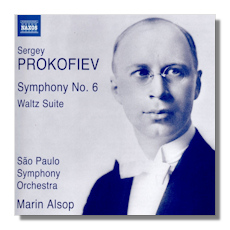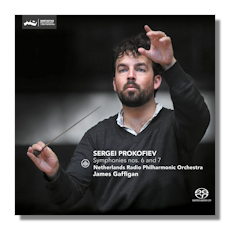
The Internet's Premier Classical Music Source
Related Links
- Prokofieff Reviews
- Latest Reviews
- More Reviews
-
By Composer
-
Collections
DVD & Blu-ray
Books
Concert Reviews
Articles/Interviews
Software
Audio
Search Amazon
Recommended Links
Site News
 SACD Review
SACD Review
Serge Prokofieff

- Symphony #6 in E Flat minor, Op. 111
- Waltz Suite, Op. 110
- Since We Met (from "War and Peace")
- In the Palace (from "Cinderella")
- Mephisto Waltz (from "Lermontov")
- End of the Fairy Tale (from "Cinderella")
- New Year's Eve Ball (from "War and Peace")
- Happiness (from "Cinderella")
Sao Paulo Symphony Orchestra/Marin Alsop
Naxos 8.573518 68:21


- Symphony #6 in E Flat minor, Op. 111
- Symphony #7 in C Sharp minor, Op. 131
Netherlands Radio Philharmonic Orchestra/James Gaffigan
Challenge Classics SACD CC72714 Hybrid MUltichannel 72:53
Here are two more entries in different Prokofiev symphony cycles, a realm where there has been lots of activity lately, as five different conductors decided to take on the complete set at just about the same time. Four are still ongoing as I write this (Litton/BIS, Gergiev/Mariinsky, and the two here – Alsop/Naxos and Gaffigan/Challenge Classics). The remaining one was completed near the end of last year, the Karabits effort on Onyx. I am covering them all, though I've missed an issue here and there from a couple of them. From what I've heard of the work of these five conductors in this repertory, I can say that not one of them has turned out a weak or even average performance thus far. I should point out that this is my first sampling of the Gaffigan cycle, and it speaks very well for him. By the way, three of these conductors are American and two are Russian. I think you can figure out the nationalities of them.
Let's turn to the Alsop CD first. To summarize her now nearly complete cycle, she began in 2012 with a strong Fifth (Naxos 8.573029), followed with one of the finest versions of the Fourth the next year (Naxos Blu-ray 38), came out with a brilliant First and scorching Second in 2014 (Naxos Blu-ray 44), and then delivered a good but not great Third last year (Naxos Blu-ray 47). One thing I've noticed about Alsop's cycle is that the orchestra seems to be getting better with each performance. Whether that's because they were less familiar with Prokofiev's rather individual style at the outset and have gradually grown accustomed to it or that they, under Alsop's guidance, are simply getting better, I can't say.
This account of the Sixth rivals her powerful take on the Second as her greatest effort in this series thus far. Alsop's tempos are brisk in the first movement, closer to those of Mravinsky and Rozhdestvensky than to the slower ones of Gergiev (especially in his later Mariinsky version), Weller, Rostropovich, Ozawa, Jarvi, Previn and most others. The movement is marked Allegro moderato, but because the music is of such depth and complexity most conductors stretch the tempos a bit to plumb for its abundant profundities. Alsop's funeral march, right at the beginning of the development section, is very brisk but well phrased and played, and the two later climaxes come on with plenty of power. Much essential detail is brought out and the whole movement is as well conceived and played as just about any other performance from among the twenty or more recordings of it that I have.
The middle movement (there are only three in this symphony) is taken at moderate tempos and again Alsop's interpretation and the execution by the orchestra are both superb. I do think, however, that an even slower tempo in the main theme generally works even more effectively. There are no complaints about the tempos in the finale: everything zips along with plenty of detail, color and energy – and we can feel the joy and hope. But then, right after the utterly ecstatic final appearance of the lively main theme, Alsop and her players also make us feel the total collapse and catastrophe that close out this powerful symphony. Perhaps the music could sound a little more desperate when it's winding down and leading to the reappearance of the alternate theme from the first movement, but this is still a strong account of this sort of Jekyll and Hyde finale. In sum, this is a brilliant performance of this great symphony and can rival the best versions, including either Gergiev effort, the Kitayenko, Järvi and Weller.
The Waltz Suite, not actually a light or frivolous work at all as you might suspect from its title, is played with the same commitment and attention to detail and phrasing. The middle section of Since We Met is deliciously sinister-sounding here, and features some fine playing by a couple of the principals in the string section. You feel that same dark character in the next Waltz, In the Palace, and so delightfully. You'd think the Mephisto Waltz might carry a bit of that quality here as well, but it's all good fun – sort of menacing fun – and brilliantly played. The ensuing End of the Fairy Tale is beautifully conceived and performed, and the two closing waltzes, with their mixture of anxiety and celebration, are also splendidly realized. This is the best account of this work that I have yet heard. As for the sound reproduction on this Naxos CD, it is slightly recessed but more than adequate.
I ranked the Alsop as rivaling the previous best versions of the Sixth, but what about this one from James Gaffigan and the Netherlands Radio Philharmonic Orchestra? Actually, I could (and will) also include it in the running among the best versions of this symphony. Gaffigan is considerably slower in the first movement than Alsop: 15:04 vs. 13:23. That said, Gaffigan, as suggested above, is actually more in line with the majority of conductors in that respect than Alsop. His first movement is intelligently phrased and well played by this Netherlands ensemble: the hushed mournfulness and mystery of the exposition come through with plenty of atmosphere and feeling, while the funeral march and the stormy buildup and climaxes that follow have just about all the energy and power to register the proper effect. Here, he may actually exceed Alsop in pure power and excitement, but the final climax is a bit subdued, mainly because there is a sort of spongy sound to the timpani. Ozawa had a similar problem in his recording of the work with the Berlin Philharmonic. The sound on this Challenge Classics disc is otherwise superb in its clarity and instrumental balances throughout both symphonies.
Gaffigan's second and third movements have tempos similar to those of Alsop. You hear a lot of detail and there is a sense of lushness to Prokofiev's lyricism in the second movement. The finale's closing pages have a feeling of gut-wrenching tragedy and painful loss: when echoes of the first movement funeral march appear the roars from the gong come on like death itself, and the ensuing rush to the end, with that crushing rhythm angrily stamping out everything in its path, is utterly powerful in its sense of brutal finality. Gaffigan's Sixth has a little more bite and bigness than Alsop's, but the latter features a rawness and drive that's just as valid on its own terms. So, in the end both these accounts of the Sixth are quite excellent and I wouldn't want to be without either one. Prokofiev completists should certainly seek them out. What may help others decide on purchase are the couplings.
Gaffigan's coupling here isn't exactly what you'd call a filler, as it is the very substantial Seventh Symphony, a work that until very recently was considerably more popular than the once-neglected Sixth. The Seventh here is interpreted in a fairly straightforward manner while exuding a sense of warmth and nostalgia in the lyrical moments of the first and third movements, as well as in the climax of the finale. Prokofiev's clever Scherzo, with its high spirits and shifting moods comes through with great color, though I think the ending should go at a somewhat faster clip. The third movement is quite lovely here, Gaffigan making his slightly faster than consensus tempos work just fine. The finale is right on as the music comes across as joyous and playful in the first half and quite touching and sad in the latter half with the reappearance of themes from the first movement. I must say that the piano is miked pretty closely throughout these performances, and it really sounds especially effective in the finale here. All in all, this is a great Seventh Symphony from Gaffigan and this fine Dutch orchestra, one to stand with my favorites, by Kitayenko, Previn, Tennstedt and, from way back, Nikolai Anosov, the father of Gennady Rozhdestvensky. But the Challenge Classics CD features better sound than any of these. In sum, I highly recommend Gaffigan's new Prokofiev Sixth and Seventh. I anxiously await his further issues in this series.
Copyright © 2016, Robert Cummings


















